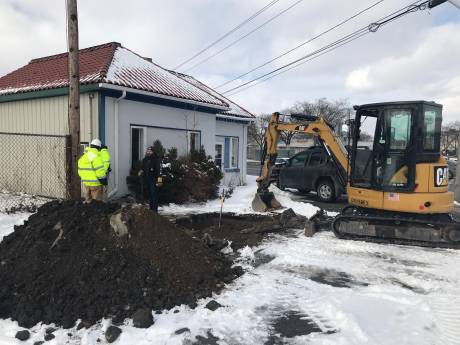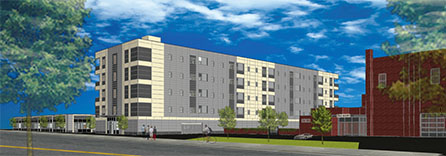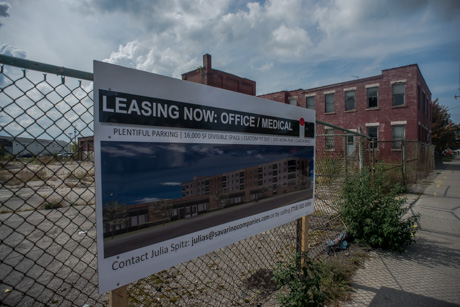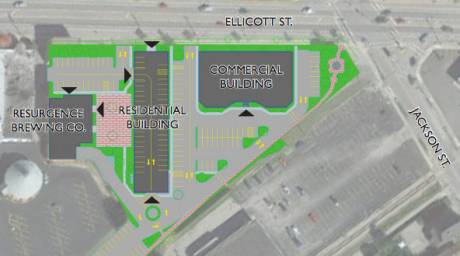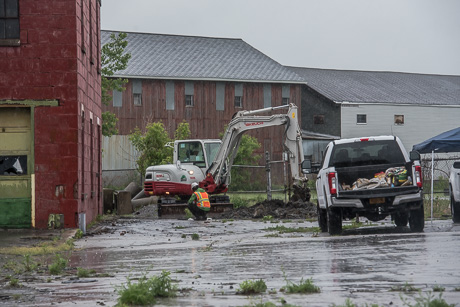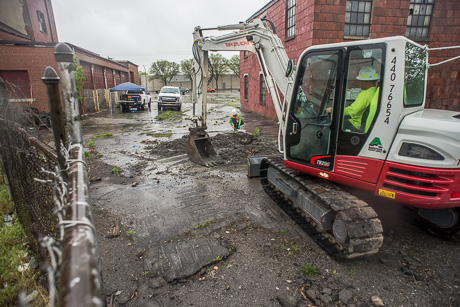Are you ready for a resurgence in Batavia? It's coming.
Well, at least Resurgence Brewing Company of Buffalo is coming.
The popular Buffalo-based brewery is going to be part of the revitalized and rebuilt Ellicott Station (the former Della Penna property) on Ellicott Street on the edge of Downtown Batavia.
"We're obviously ecstatic about the project and seeing it come to fruition," said City Manager Jason Molino. "We're incredibly excited about Resurgence, a reputable brewery coming to the community and bringing a new, kind of niche beer, sour beer. I think it's going to help complement what we're trying to do downtown, bringing in more dining and entertainment options for people."
We've known for a long time that Ellicott Station would include a brewery and brew pub. What we didn't learn until today is that the company moving into the space would be a brand that has rapidly grown in popularity in Buffalo.
Resurgence will open a restaurant, a brew pub and beer garden that will serve their full line of beers, and a brewery that will produce sour beer, a kind of beer that has only recently started to reach the East Coast market.
Because its brew process is different and the yeasts involved can't mix with the other brews, Resurgence was looking for a location separate from their current Buffalo location.
In fact, Batavia had been on the map for Resurgence owners Chris and Jeff Ware for a long time, according to developer Sam Savarino. Savarino said he had heard the Wares had been looking at Batavia as a possible location for a brewery if not a restaurant and pub. After his company won the RFP for the Ellicott Station project, he contacted them and a deal came together very quickly, he said.
"They’re good people," Savarino said. "They’re dedicated to their craft and they care about the product they produce. That’s evident to anybody who has bought their products or visited their premises in Buffalo. As far as a brewer or retail tenant, they are a very good bet."
The Resurgence name comes from the founders' own belief in the resurgence and renaissance of Buffalo, which they've been a part of over the past several years.
Jeff Ware, company president, sent over a statement about how pleased the company is to find a location in Batavia.
"Resurgence Brewing Company is excited to announce their new brewing and biergarten location in Batavia," Ware said. "The brewery will anchor Savarino's Ellicott Station Development and help with the revitalization of downtown Batavia. With the help from New York State from Homes and Community Renewal (state pass-through of the Community Block Development Grant money mentioned below), we will be able to move project one step closer to reality."
Savarino got involved in the project after a third party told him about Batavia looking for proposals to redevelop the Della Penna property and that Savarino Companies might be a good fit.
The company has been involved in a number of revitalization projects in Buffalo. They redeveloped several buildings in the Cobblestone District of Buffalo, renovating buildings and developing mixed-use projects. They redeveloped 500 Seneca Street, a large factory converted to mixed use. They also redeveloped River Landing in Buffalo, which was a brownfield project.
Savarino said when he looked at the Della Penna property, he checked off the qualifications: A distressed property with possible environmental contamination; a distressed census tract with 35 percent unemployment; a median income that is 50 percent of the area's median income; on the edge of a downtrodden downtown.
"I joked with my friends that it had several strikes against it, so it's just the kind of project we like to take on," Savarino said.
The project will be more than just a restaurant and brewery. There will also be office space -- Savarino said he's in negotiations with possible tenants that he can't disclose yet -- and a 47-unit, four-story apartment complex.
The apartments will be especially great for Downtown, Molino said. Not only will tenants be just steps from Resurgence, within a block's walk are dining and drinking options such as City Slickers, Bourbon & Burger Co., O'Lacy's Irish Pub and Center Street Smoke House, Main Street Pizza Co., and T.F. Brown's.
"Those 47 market-rate apartments fit the demand we're seeing for living downtown," Molino said. "People want to live in downtown areas, whether it's Millennials, seniors or empty-nesters. They have overlapping interests."
Much of what we see on the Della Penna property will be demolished, Savarino said. The front of the Della Penna main building is too far gone to save and the garage to the east of the main building isn't structurally sound and is beyond repair. The main production area of the Della Penna will be restored, and that area is a perfect fit for what Resurgence plans to do, both for its size and design characteristics.
"It's important to have some link to the past," Savarino said. "It wouldn't be the same without that link. It makes the site unique to have a little bit of Batavia's past as a part of it."
Resurgence, combined with the new food establishments, brewery, and apartments going into the former Newberry building, he said, hit key redevelopment goals for Batavia.
"It really completes the project of living in a revived downtown," Molino said.
To help move the project along, Genesee County Economic Development Center is using money from the federal CDBG program. The $15 million project will receive $210,000 that will be half loan and half grant if project requirements are met. The restaurant and brewery are expected to create 15 full-time equivalent jobs, three-quarters of which will go to low- and moderate-income residents.
Getting the project to this point has been a long haul, said Julie Pacatte, coordinator of the Batavia Development Corporation.
"We've been talking about this project for a long time and people have been waiting for some movement," Pacatte said. "I think it just shows how long it takes to get things lined up before we can go public with an announcement."
Financing for the project is coming from several sources, Savarino said, and he expects financing to close in July. Construction should begin by August and Resurgence should open its doors during the first quarter of 2018.
The way the project came together, Molino said, with the involvement of the City School District, GCEDC, the county, BDC, and the City, it's really a model for how revitalization projects can be handled when everybody works together for a common goal.
"It was great work from everybody involved with great support from Resurgence," Molino said. "When you talk about how projects come together, it's really a model for best practices of the collaboration of the different entities involved.
The "heartfelt dedication" local officials had for the project was notable, Savarino said.
"I can’t say enough about working with the City of Batavia and the Batavia Development Corporation," Savarino said. "It’s quite unusual to have that level cooperation and to be working on the same side of the table with people like that."
Molino was pleased to hear the praise.
"That's what we're trying to say with the '$100 Million I'm All In' initiative," Molino said. "We want to give people the experience of great service. We want people to say, 'I can't imagine doing business anyplace other than the City of Batavia. His comment just reinforces what we're trying to say and do to make the experience great for people."

